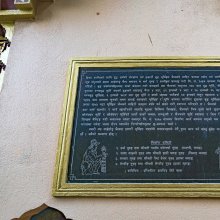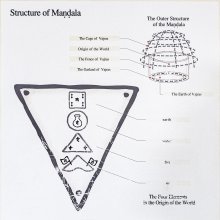Kramashas, Kramaśas, Kramashah: 13 definitions
Introduction:
Kramashas means something in Jainism, Prakrit, Hinduism, Sanskrit, Marathi, Hindi. If you want to know the exact meaning, history, etymology or English translation of this term then check out the descriptions on this page. Add your comment or reference to a book if you want to contribute to this summary article.
The Sanskrit term Kramaśas can be transliterated into English as Kramasas or Kramashas, using the IAST transliteration scheme (?).
Images (photo gallery)
In Jainism
General definition (in Jainism)
Source: The University of Sydney: A study of the Twelve ReflectionsKramaśas (क्रमशस्) refers to “in that order”, according to the 11th century Jñānārṇava, a treatise on Jain Yoga in roughly 2200 Sanskrit verses composed by Śubhacandra.—Accordingly, “Virtuous meditation is of four kinds, examination of the instruction [of the Jina], [examination of] suffering, [examination of] the results of karma and [examination of] the form [of the universe] individually in that order (kramaśas)”.

Jainism is an Indian religion of Dharma whose doctrine revolves around harmlessness (ahimsa) towards every living being. The two major branches (Digambara and Svetambara) of Jainism stimulate self-control (or, shramana, ‘self-reliance’) and spiritual development through a path of peace for the soul to progess to the ultimate goal.
Languages of India and abroad
Marathi-English dictionary
Source: DDSA: The Molesworth Marathi and English DictionaryKramaśaḥ (क्रमशः).—ad S kramataḥ ad S Regularly, in order or method.
Marathi is an Indo-European language having over 70 million native speakers people in (predominantly) Maharashtra India. Marathi, like many other Indo-Aryan languages, evolved from early forms of Prakrit, which itself is a subset of Sanskrit, one of the most ancient languages of the world.
Sanskrit dictionary
Source: DDSA: The practical Sanskrit-English dictionaryKramaśas (क्रमशस्).—ind.
1) In due order, regularly, successively, seriatim.
2) Gradually, by degrees; R.12.47; क्रम- शस्तन्निबोधत (krama- śastannibodhata) Manusmṛti 1.68,3.12.
Derivable forms: kramaśaḥ (क्रमशः).
Source: Cologne Digital Sanskrit Dictionaries: Shabda-Sagara Sanskrit-English DictionaryKramaśas (क्रमशस्).—ind. 1. Gradually, by degrees. 2. Regularly, seriatim. E. krama, and śasi aff.
Source: Cologne Digital Sanskrit Dictionaries: Benfey Sanskrit-English DictionaryKramaśas (क्रमशस्).—[krama + śas], adv. 1. By degrees, [Pañcatantra] ii. [distich] 37. 2. In order, [Mānavadharmaśāstra] 1, 68.
Source: Cologne Digital Sanskrit Dictionaries: Cappeller Sanskrit-English DictionaryKramaśas (क्रमशस्).—[adverb] step by step, in order, gradually.
Source: Cologne Digital Sanskrit Dictionaries: Monier-Williams Sanskrit-English Dictionary1) Kramaśas (क्रमशस्):—[=krama-śas] [from krama > kram] ind. gradually, by degrees, [Manu-smṛti; Rāmāyaṇa; Suśruta; Kapila’s Sāṃkhya-pravacana] etc.
2) [v.s. ...] regularly, seriatim, [Manu-smṛti; Rāmāyaṇa; Sāṃkhyakārikā etc.]
Source: Cologne Digital Sanskrit Dictionaries: Yates Sanskrit-English DictionaryKramaśas (क्रमशस्):—adv. By degrees.
[Sanskrit to German]
Sanskrit, also spelled संस्कृतम् (saṃskṛtam), is an ancient language of India commonly seen as the grandmother of the Indo-European language family (even English!). Closely allied with Prakrit and Pali, Sanskrit is more exhaustive in both grammar and terms and has the most extensive collection of literature in the world, greatly surpassing its sister-languages Greek and Latin.
Hindi dictionary
Source: DDSA: A practical Hindi-English dictionaryKramaśaḥ (क्रमशः) [Also spelled kramash]:—(adv) respectively; in order; by degrees.
...
Kannada-English dictionary
Source: Alar: Kannada-English corpusKramaśaḥ (ಕ್ರಮಶಃ):—
1) [adverb] one after another in order; point by point; serially; seriatim.
2) [adverb] gradually; in the course of.
Kannada is a Dravidian language (as opposed to the Indo-European language family) mainly spoken in the southwestern region of India.
Nepali dictionary
Source: unoes: Nepali-English DictionaryKramaśaḥ (क्रमशः):—indecl. 1. gradually; 2. serially;
Nepali is the primary language of the Nepalese people counting almost 20 million native speakers. The country of Nepal is situated in the Himalaya mountain range to the north of India.
See also (Relevant definitions)
Partial matches: Krama, Shash.
Starts with: Kramashastra.
Ends with: Akramashas.
Full-text: Ekottara, Kramasha, Kramash, Abhojya, Anuvritta, Nishkarsha, Samdrishtika, Pitaka, Abhojyanna, Yugapad, Anantara, Bindu, Abja, Vriddhi.
Relevant text
Search found 10 books and stories containing Kramashas, Kramaśas, Kramashah, Krama-sas, Krama-śas, Kramasas, Krama-shas, Kramaśaḥ, Kramasah, Kramaśah; (plurals include: Kramashases, Kramaśases, Kramashahs, sases, śases, Kramasases, shases, Kramaśaḥs, Kramasahs, Kramaśahs). You can also click to the full overview containing English textual excerpts. Below are direct links for the most relevant articles:
Tattvartha Sutra (with commentary) (by Vijay K. Jain)
Verse 2.2 - Various kinds of disposition (bhāva) < [Chapter 2 - Category of the Living]
Verse 2.20 - The objects of the five senses (indriya) < [Chapter 2 - Category of the Living]
Verse 2.9 - Two kinds of cognition (upayoga) < [Chapter 2 - Category of the Living]
Manusmriti with the Commentary of Medhatithi (by Ganganatha Jha)
Verse 9.220 < [Section XXX - Gambling]
Verse 4.221 < [Section XIV - Other Duties]
Verse 6.87-88 < [Section VIII - The Renouncer of the Veda (vedasaṃnyāsika)]
Brihad Bhagavatamrita (commentary) (by Śrī Śrīmad Bhaktivedānta Nārāyana Gosvāmī Mahārāja)
Verse 2.3.11 < [Chapter 3 - Bhajana (loving service)]
Maha Prajnaparamita Sastra (by Gelongma Karma Migme Chödrön)
II.2. Dharma, obtaining its retribution in the present lifetime (saṃdṛṣṭika) < [II. Recollection of the Dharma (dharmānusmṛti)]
IV. Results of the Nine Notions < [Part 1 - The nine notions according to the Abhidharma]
III.a Causality according to the Abhidharma < [Part 1 - Understanding the Conditions (pratyaya)]
Bhajana-Rahasya (by Srila Bhaktivinoda Thakura Mahasaya)
Text 2 < [Chapter 5 - Pañcama-yāma-sādhana (Aparāhna-kālīya-bhajana–kṛṣṇa-āsakti)]
Text 10 < [Chapter 1 - Prathama-yāma-sādhana (Niśānta-bhajana–śraddhā)]
Padarthadharmasamgraha and Nyayakandali (by Ganganatha Jha)

